Meet the Micros...
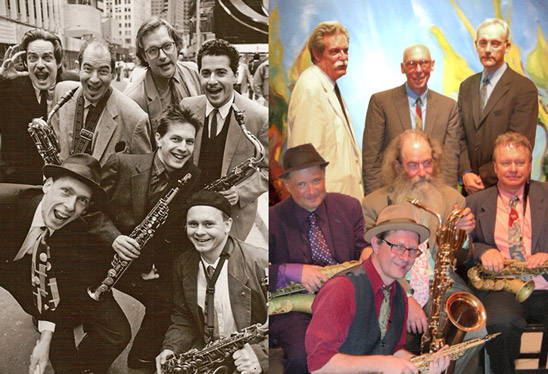
PHILLIP JOHNSTON
After disbanding the Microscopic Septet, Johnston focused his attention on composing film, theater, and dance scores, in addition to doing work for radio and TV. A prolific composer, he has scored more than a dozen motion pictures, working with such directors as Doris Dörrie, Paul Mazursky (Faithful), and Philip Haas (The Music of Chance). In addition, he’s done scores for silent movies, including F.W. Murnau’s Faust (1927), which premiered at the 2002 New York Film Festival and has subsequently toured Europe and the US. Two CDs of Johnston’s film scores have been released by Zorn: a compilation of film scores, Music for Films (1998, Tzadik), and The Unknown (1994, Avant), a score for Tod Browning’s 1927 silent film. Johnston has also collaborated with artist Art Spiegelman (Maus) on “Drawn To Death: A Three-Panel Opera”. The growing friendship between them led to Spiegelman’s offer to contribute the cover art for the Microscopic Septet re-releases on Cuneiform. Johnston’s distinctive compositions are most notable for their defiance of genre and consistently pervasive humor. As Seth Rogovy wrote in the Berkshire Eagle: “What distinguishes or characterizes Johnston’s work, and what makes it impossible to tame or define in conventional terms, is its willful perversity—its utter unwillingness to stay in one place, its defiance of genre, its universal embrace of the offbeat, its celebration of the quirky, dramatic and surprising gesture. His scores can flow seamlessly from cocktail jazz to horn-laced funk grooves to acoustic chamber music to synthesized electronics to frenzied post-bop to banjo bluegrass to rock ‘n’ roll to ersatz klezmer to cartoon music to skronking metal to Asian harp to blues guitar riffs to blowzy polka and back to classically-styled, string quartet music.” In 2005 Johnston moved with his family to Sydney, Australia, where he leads The Coolerators and SNAP and writes music for film and theatre. He continues to perform in Europe and the US from time to time. |
||
JOEL FORRESTER
Born in Pittsburgh, Forrester, upon moving to New York City as a young man, met Thelonious Monk, who urged him to focus on “music that hadn’t been written yet.” The Paris Free Voice relates Forrester’s unique tutelage under the guidance of Monk shortly before his death in 1982: “Fully dressed, Monk would lie on top of his bed, listening to Forrester’s playing in the adjoining room. ‘It was the most acute form of musical criticism I’ve ever received,’ recalls Forrester. ‘If he didn’t like what I was playing, he’d just stretch his foot off the bed and kick the door shut!’” Critics worldwide have extolled Forrester’s compositional and improvisational expertise. Heather Phares of All Music Guide describes his “complex, often witty composition skills,” while The New Yorker lauds Forrester as “a most agreeably eclectic pianist, and among the most undervalued of jazz composers. The sheer pleasure he brings to a panoply of styles, and to the individual way he absorbs them all, denotes comfort rather than scholarly erudition.” A review from All About Jazz perhaps best locates Forrester in the school of modern jazz: “Joel Forrester in an undiscovered national treasure. He is brilliant both as a pianist and as a composer. His music is intelligent, witty, and colorful as it looks into the jazz tradition and emerges as something individual and different. Millions have heard his great theme for the NPR show Fresh Air with Terry Gross... The music is identifiably Joel’s—ever-fresh and smartly swinging.” |
||
DON DAVIS
Follow Don Davis on Twitter. |
MIKE HASHIM
|
|
DAVE SEWELSON
|
DAVID HOFSTRA
|
|
RICHARD DWORKIN
|
||
...and Micros Past
JOHN HAGEN
Appearing in sessions with William Parker in the 1970s and the Microscopic Septet in the 1980s, saxophonist John Hagen released his first solo album, Segments, on Cadence Jazz Records in 2004. He replaced George Bishop, the original tenor player in the Microscopic Septet, early on and performed on Take the Z Train and the unreleased pre-Take The Z Train session.
DANNY NIGRO
Saxophonist Danny Nigro has appeared on recordings from Plant the Seed (Plant the Seed, OFMB, 2005), and The Dalton Gang (Last Year’s Waltz, Second Step Music, 2006). He toured Europe in 1984, subbing for Paul Shapiro, and appears on Let’s Flip!
PAUL SHAPIRO
Saxophonist, flutist, composer, and bandleader Paul Shapiro has been active on the New York scene for over two decades. He currently leads two projects: his jazz group Midnight Minyan and his ’40s Yiddish swing project, Paul Shapiro’s Ribs and Brisket Revue. As a solo artist he has released two albums, Midnight Minyan in 2003 and It’s in the Twilight in 2006, both on the Tzadik label. He has also recorded and/or worked with such diverse artists as Lou Reed, Brooklyn Funk Essentials, Michael Callen, Jay-Z, Ben Folds Five, Steven Bernstein, John Zorn, Ofra Haza, Naughty By Nature, Marc Anthony, Frankie Knuckles, Elliott Sharp, Wayne Horvitz and Queen Latifah, Majek Fashek, Khaled, and many others.
JOHN ZORN
Composer and saxophonist John Zorn has been a leading figure in the New York Downtown scene since the 1970s. As a key figure and major player in the avant scene, Zorn has been a member of Naked City, Cobra, and Masada, among many other bands, often recording albums at a prolific pace. Zorn has also recorded as a solo artist and founded the Tzadik label, specializing in experimental, jazz, and avant-garde music. Zorn was the original alto saxophonist in the Microscopic Septet and appears on the unreleased pre-Take The Z Train session.

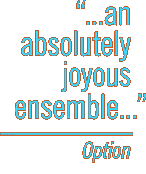
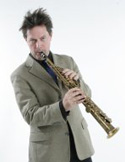 One of the most active saxophonists and composers (theatre, dance, film scores, and jazz music) in New York’s Downtown scene,
One of the most active saxophonists and composers (theatre, dance, film scores, and jazz music) in New York’s Downtown scene, 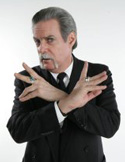 Pianist, composer, and arranger
Pianist, composer, and arranger 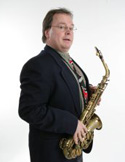 Alto saxophonist
Alto saxophonist 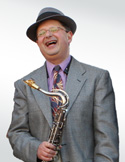 Alto and soprano saxophonist Mike Hashim has enjoyed a long and fruitful career in which he has played with a wide variety of musicians and traveled the world as a jazz ambassador. He attended the Creative Musicians Workshop in the summer of 1974, where he studied with avant-garde and post-bop explorers Dave Holland, Lee Konitz, Leroy Jenkins, and Milford Graves. Residing in New York, he later took lessons with instructors as diverse as Jimmy Lyons, Andy McGhee, and Phil Woods. A longtime member of the Widespread Jazz Orchestra, Hashim has also worked with a number of great blues men, including Muddy Waters, Sonny Greer, and Clarence “Gatemouth” Brown. He has led his own quartet since 1979 and has collaborated for years with pianist Mike Ledonne. In 1992, as part of a Carmichael tour sponsored by the USIS, Hashim was a member of the first official jazz group to play in China since 1949. A composer for film, TV, and dance, Hashim can be heard on his own albums for Stash, 33, and Hep.
Alto and soprano saxophonist Mike Hashim has enjoyed a long and fruitful career in which he has played with a wide variety of musicians and traveled the world as a jazz ambassador. He attended the Creative Musicians Workshop in the summer of 1974, where he studied with avant-garde and post-bop explorers Dave Holland, Lee Konitz, Leroy Jenkins, and Milford Graves. Residing in New York, he later took lessons with instructors as diverse as Jimmy Lyons, Andy McGhee, and Phil Woods. A longtime member of the Widespread Jazz Orchestra, Hashim has also worked with a number of great blues men, including Muddy Waters, Sonny Greer, and Clarence “Gatemouth” Brown. He has led his own quartet since 1979 and has collaborated for years with pianist Mike Ledonne. In 1992, as part of a Carmichael tour sponsored by the USIS, Hashim was a member of the first official jazz group to play in China since 1949. A composer for film, TV, and dance, Hashim can be heard on his own albums for Stash, 33, and Hep.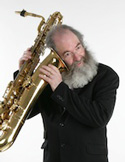 Saxophonist
Saxophonist 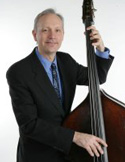 Bassist and tuba player David Hofstra has performed on close to 100 CDs since 1980. Constantly active on the New York jazz scene, he has recorded with Wayne Horvitz, Bobby Previte, Michael Callen, Bobby Radcliff, Bill Frisell, The Waitresses, Robin Holcomb, John Zorn, Elliot Sharp, The Metropolitan Klezmer Orchestra, Mark Ribot, Lou Grassi, Sewelsonics, William Parker, and many others.
Bassist and tuba player David Hofstra has performed on close to 100 CDs since 1980. Constantly active on the New York jazz scene, he has recorded with Wayne Horvitz, Bobby Previte, Michael Callen, Bobby Radcliff, Bill Frisell, The Waitresses, Robin Holcomb, John Zorn, Elliot Sharp, The Metropolitan Klezmer Orchestra, Mark Ribot, Lou Grassi, Sewelsonics, William Parker, and many others.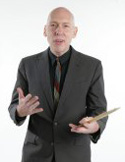 Drummer Richard Dworkin has been active on the New York scene since 1980 when he began playing with the Microscopic Septet. He has appeared on over 35 CDs, drumming for James Chance, Alex Chilton, Philip Johnston’s Big Trouble, Bobby Radcliff, Harry Shearer, Samm Bennett, Eric Anderson, Fast ‘n Bulbous, Michael Callen, and others.
Drummer Richard Dworkin has been active on the New York scene since 1980 when he began playing with the Microscopic Septet. He has appeared on over 35 CDs, drumming for James Chance, Alex Chilton, Philip Johnston’s Big Trouble, Bobby Radcliff, Harry Shearer, Samm Bennett, Eric Anderson, Fast ‘n Bulbous, Michael Callen, and others.